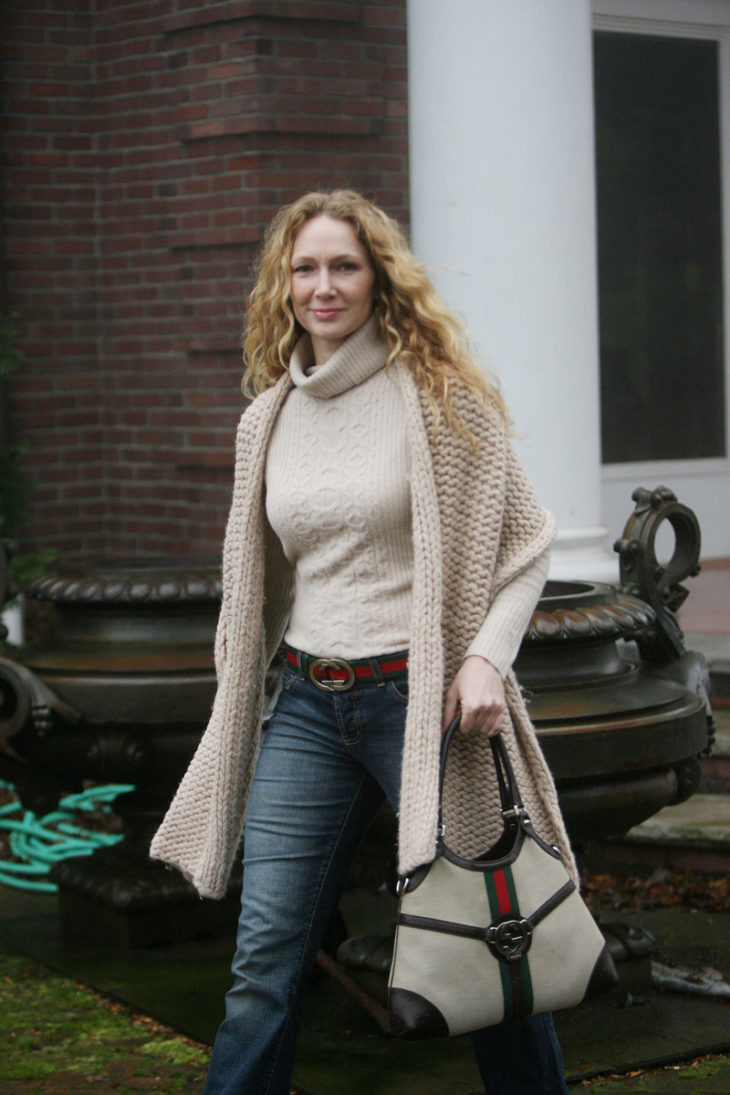Unlock Unmatched Durability: A Tech-Savvy Guide To Jean Muggli
"Jean Muggli" is a noun that refers to a type of denim fabric known for its distinctive diagonal twill weave, creating a robust and durable material. Jeans, a popular garment made from this fabric, have become ubiquitous streetwear worldwide.
The durability and versatility of Jean Muggli make it ideal for various applications, including workwear, casual clothing, and accessories. It has gained immense popularity over the years, with significant historical developments like the invention of blue jeans in the 19th century. This article will delve into the fascinating history, cultural impact, and production methods of Jean Muggli.
Let us explore the intricate world of Jean Muggli, tracing its origins, innovations, and the reasons for its enduring appeal.
- Juanita Du Plessis Bio Age Wiki Facts
- Ify Nwadiwe And Wife Aurora Has A
- Get To Know Tiania Haneline Her Boyfriend
- Virginia Madsen And Her Partner Had An
- Vick Hope Bio Age Wiki Facts And
Jean Muggli
The multifaceted nature of Jean Muggli encompasses various key aspects that contribute to its significance. Understanding these aspects is crucial to gaining a comprehensive overview of this durable and versatile fabric.
- Weave
- Durability
- Versatility
- History
- Cultural Impact
- Production
- Sustainability
- Fashion
The unique diagonal twill weave grants Jean Muggli its characteristic strength and texture. Its durability has made it a mainstay in workwear and casual clothing. The fabric's versatility extends from classic denim jeans to a wide range of garments and accessories. Historically, Jean Muggli played a pivotal role in the development of blue jeans and continues to shape fashion trends. Its cultural impact is undeniable, transcending generations and socioeconomic boundaries. The production process involves intricate steps, from cotton cultivation to dyeing and weaving. Sustainability concerns have led to innovations in eco-friendly Jean Muggli production. Finally, the fabric's timeless appeal in fashion speaks to its enduring relevance and style.
Weave
The weave of a fabric significantly influences its characteristics, and in the case of Jean Muggli, the twill weave is paramount to its identity. The diagonal pattern created by the twill weave imparts a distinct texture and robust structure to Jean Muggli, making it highly durable and resistant to wear and tear. This durability has been a key factor in the fabric's popularity for workwear, such as overalls and jeans, which often endure strenuous conditions.
- Does Phaedra Parks Own A Funeral Home
- Dr Cade Hunzeker Cause And Death How
- Ebony Obsidian Parents Where Are They Now
- Dekenta Parchman Michigan Man 30 Who Tortured
- Kevin Kline Bio Age Net Worth Wife
The twill weave also contributes to Jean Muggli's versatility. By varying the weight and tightness of the weave, manufacturers can create a range of fabrics with different properties. For instance, heavier and more tightly woven Jean Muggli is ideal for sturdy workwear, while lighter and looser weaves are better suited for casual clothing and accessories. This versatility allows Jean Muggli to cater to a wide spectrum of applications.
Understanding the connection between weave and Jean Muggli provides valuable insights into the fabric's properties and applications. It enables designers and manufacturers to tailor the fabric to specific requirements, ensuring optimal performance and durability. Furthermore, appreciating the intricacies of the twill weave enhances the appreciation for the craftsmanship and innovation that goes into creating high-quality Jean Muggli products.
Durability
Durability is a defining characteristic of Jean Muggli, contributing to its widespread use in a variety of applications, from rugged workwear to stylish casual clothing. This durability stems from several intrinsic qualities of the fabric.
- Strength
The twill weave of Jean Muggli interlaces the fibers tightly, creating a strong and resilient fabric that is resistant to tearing and abrasion. This makes it ideal for garments that endure rough handling and frequent wear.
- Abrasion Resistance
The tightly packed fibers of Jean Muggli provide excellent resistance to abrasion, ensuring that the fabric retains its integrity even after repeated rubbing and friction. This property makes it suitable for workwear, such as jeans and overalls, which are often subjected to harsh conditions.
- Colorfastness
Jean Muggli is known for its excellent colorfastness, meaning that the dyes used to color the fabric resist fading over time. This ensures that garments made from Jean Muggli retain their vibrant hues even after numerous washes and exposure to sunlight.
- Shape Retention
The durable construction of Jean Muggli allows it to maintain its shape and structure over extended periods of wear. This shape retention ensures that garments made from Jean Muggli look sharp and professional, even after repeated laundering.
The combination of these durability factors makes Jean Muggli a reliable and long-lasting fabric choice. Its strength, abrasion resistance, colorfastness, and shape retention contribute to its exceptional performance and longevity, making it a favorite among consumers and manufacturers alike.
Versatility
Versatility is a key characteristic of Jean Muggli, allowing it to adapt to a wide range of applications and styles. This versatility stems from several factors, including its:
- Durability
Jean Muggli's exceptional durability makes it suitable for both rugged workwear and delicate fashion items. Its ability to withstand wear and tear ensures longevity and adaptability to various uses.
- Breathability
The unique weave of Jean Muggli allows for breathability, making it comfortable to wear in different climates and activities. This versatility extends its use from heavy-duty work environments to casual, everyday wear.
- Dyeability
Jean Muggli's dyeability allows for a vast array of colors and finishes. This versatility enables designers to create garments that cater to diverse tastes and trends, from classic indigo denim to vibrant fashion pieces.
- Styling Options
Jean Muggli can be tailored into a multitude of styles, from classic jeans and jackets to skirts, dresses, and accessories. This versatility makes it a wardrobe staple that can be dressed up or down, adapting to different occasions and personal preferences.
The versatility of Jean Muggli extends beyond its physical properties to its cultural significance. It has become a symbol of both rugged individualism and fashion-forward style, transcending generations and social boundaries. This adaptability and widespread appeal make Jean Muggli a truly versatile fabric that continues to shape the world of fashion and beyond.
History
History plays a pivotal role in understanding the significance and evolution of Jean Muggli. Its rich past encompasses various milestones, innovations, and cultural influences that have shaped its identity and enduring appeal.
- Origins
The roots of Jean Muggli can be traced back to ancient times, with similar fabrics woven in regions like India and China. However, its modern incarnation emerged in the 17th century in the town of Nimes, France, where it was known as "Serge de Nimes." - Blue Jeans
A significant chapter in Jean Muggli's history began in the 19th century when Levi Strauss and Jacob Davis created the iconic blue jeans. Designed for durability and functionality, these jeans became synonymous with workwear and later evolved into a global fashion staple. - Cultural Impact
Jean Muggli has transcended its practical origins to become a cultural phenomenon. It has been embraced by various subcultures, from cowboys and bikers to hippies and fashion icons. This cultural impact has solidified Jean Muggli's status as a symbol of both rugged individualism and fashion-forward style. - Technological Advancements
Over the years, Jean Muggli production has undergone significant technological advancements. The invention of the power loom in the 18th century revolutionized weaving, while modern innovations like laser cutting and eco-friendly dyeing techniques have further refined its production.
These historical facets provide a glimpse into the rich tapestry of Jean Muggli's evolution, highlighting its origins, iconic creations, cultural significance, and ongoing innovations. Understanding its history helps us appreciate the enduring appeal and versatility of this remarkable fabric.
Cultural Impact
The cultural impact of Jean Muggli extends beyond its practical origins as a durable fabric. It has become a cultural phenomenon, deeply embedded in various subcultures and societal movements. This impact can be attributed to several key facets:
- Symbol of Rebellion
Jean Muggli has often been associated with rebellion and non-conformity. From the greasers of the 1950s to the hippies of the 1960s, wearing jeans was a way to express individuality and break societal norms.
- Fashion Statement
Jean Muggli has played a significant role in fashion history. Blue jeans, in particular, have become a timeless wardrobe staple, transcending generations and styles. Designers have embraced the versatility of Jean Muggli, creating high-fashion pieces that showcase its durability and aesthetic appeal.
- Unifying Force
Despite its association with various subcultures, Jean Muggli has also become a unifying force. It is a fabric that transcends social boundaries, worn by people from all walks of life. This shared experience fosters a sense of community and belonging.
- Cultural Symbol
Jean Muggli has become a cultural symbol, representing different values and meanings. In the United States, blue jeans are often associated with patriotism and rugged individualism. In other cultures, they may symbolize modernity and Westernization.
These facets of Jean Muggli's cultural impact highlight its significance as more than just a fabric. It has become a symbol of rebellion, a fashion statement, a unifying force, and a cultural symbol, reflecting the complex and ever-evolving nature of human expression.
Production
Production lies at the heart of Jean Muggli's existence, determining its quality, availability, and environmental impact. The intricate processes involved in producing Jean Muggli, from cotton cultivation to weaving and finishing, shape its unique characteristics and contribute to its enduring appeal.
The production of Jean Muggli begins with the cultivation of cotton, a natural fiber renowned for its strength and breathability. The cotton fibers are then spun into yarn, which is subsequently dyed to achieve the desired color. The dyed yarn is then woven into the distinctive twill pattern that defines Jean Muggli. This weaving process imparts durability and a characteristic texture to the fabric.
After weaving, Jean Muggli undergoes various finishing processes to enhance its properties and appearance. These processes may include sanforization to prevent shrinkage, stonewashing to create a faded effect, and distressing to achieve a vintage look. The production of Jean Muggli involves a delicate balance of traditional techniques and modern technologies, ensuring both quality and efficiency.
Understanding the production process of Jean Muggli provides valuable insights into its sustainability, ethical considerations, and overall quality. By choosing sustainably sourced cotton and employing eco-friendly production methods, manufacturers can minimize the environmental impact of Jean Muggli production. Furthermore, responsible production practices ensure fair working conditions and ethical treatment of workers throughout the supply chain.
Sustainability
Sustainability has become an increasingly critical aspect of Jean Muggli production, encompassing practices that minimize environmental impact, promote ethical practices, and ensure the longevity of the fabric. Understanding the various facets of sustainability in relation to Jean Muggli sheds light on the responsible and eco-conscious choices made throughout its lifecycle.
- Eco-Friendly Materials
Sustainable Jean Muggli production begins with the use of eco-friendly materials, such as organic cotton grown without harmful pesticides and fertilizers. This reduces the environmental impact of cotton cultivation and promotes biodiversity.
- Water Conservation
Water conservation is crucial in Jean Muggli production, especially during dyeing and finishing processes. Sustainable practices include using water-efficient technologies, recycling water, and implementing closed-loop systems.
- Waste Reduction
Minimizing waste is essential for sustainable Jean Muggli production. This involves reducing fabric scraps, recycling by-products, and implementing zero-waste initiatives throughout the manufacturing process.
- Ethical Practices
Sustainability extends beyond environmental considerations to include ethical practices. This encompasses fair labor conditions, safe working environments, and responsible sourcing of materials, ensuring that the production of Jean Muggli aligns with social and ethical values.
By embracing these facets of sustainability, Jean Muggli manufacturers can contribute to a more sustainable fashion industry. From eco-friendly materials to ethical practices, these measures reduce the environmental footprint, promote responsible consumption, and ensure the longevity of Jean Muggli as a sustainable fabric choice.
Fashion
Fashion, with its cyclical nature and ever-changing trends, has profoundly influenced the evolution and perception of Jean Muggli. The fabric's durability and versatility make it an ideal canvas for fashion designers to showcase their creativity and cater to diverse style preferences.
As a critical component of Jean Muggli's identity, fashion has played a pivotal role in shaping its cultural significance. The iconic blue jeans, initially designed as workwear, have become a timeless fashion staple, transcending generations and social boundaries. Fashion designers have embraced Jean Muggli's versatility, incorporating it into a wide range of garments, from casual wear to haute couture. Its ability to adapt to various styles and aesthetics has solidified its position as a fashion powerhouse.
The relationship between fashion and Jean Muggli extends beyond aesthetics. Fashion has influenced the production and manufacturing techniques of Jean Muggli. Advanced technologies, such as laser cutting and eco-friendly dyeing, have been adopted to meet the demands of the fashion industry for innovative and sustainable fabric options. This symbiotic relationship has driven progress and innovation within the Jean Muggli industry, ensuring its continued relevance in the ever-evolving world of fashion.
Understanding the connection between fashion and Jean Muggli provides valuable insights into the fabric's cultural impact, adaptability, and enduring appeal. Fashion has transformed Jean Muggli from a utilitarian material into a symbol of style and self-expression, solidifying its place in the hearts and wardrobes of fashion enthusiasts worldwide.
Frequently Asked Questions
This section addresses common inquiries and provides clarification on various aspects of Jean Muggli to enhance your understanding.
Question 1: What is the origin of Jean Muggli?
Jean Muggli traces its roots to the town of Nimes, France, where it was initially known as "Serge de Nimes" in the 17th century.
Question 2: How is Jean Muggli manufactured?
Jean Muggli production involves cultivating cotton, spinning the fibers into yarn, dyeing the yarn, and weaving it into a distinctive twill pattern. Additional finishing processes enhance its properties and appearance.
Question 3: What are the key characteristics of Jean Muggli?
Jean Muggli is renowned for its durability, versatility, breathability, and ability to adapt to various styles and applications.
Question 4: How has fashion influenced the evolution of Jean Muggli?
Fashion has played a pivotal role in shaping Jean Muggli's cultural significance, with iconic garments like blue jeans becoming timeless fashion staples. Fashion designers have embraced its versatility, incorporating it into diverse styles and pushing the boundaries of innovation.
Question 5: What are the sustainability considerations in Jean Muggli production?
Sustainable Jean Muggli production involves using eco-friendly materials, conserving water, minimizing waste, and adhering to ethical practices throughout the supply chain.
Question 6: What is the future of Jean Muggli?
Jean Muggli's enduring appeal and versatility ensure its continued presence in the fashion industry. Advancements in technology and a growing emphasis on sustainability will further shape its production and applications.
These FAQs provide a comprehensive overview of Jean Muggli, its history, characteristics, fashion impact, and sustainability considerations. Delving deeper into these aspects will enhance your knowledge and appreciation of this remarkable fabric.
Let us now explore the diverse applications of Jean Muggli, from its traditional uses to its modern-day versatility.
Tips to Maximize the Benefits of Jean Muggli
To fully leverage the exceptional qualities of Jean Muggli, consider implementing these practical tips:
Tip 1: Choose Quality Materials: Opt for Jean Muggli made from high-quality cotton to ensure durability and longevity.
Tip 2: Care for Your Jean Muggli: Follow the recommended care instructions to maintain the fabric's integrity and extend its lifespan.
Tip 3: Experiment with Different Styles: Explore the versatility of Jean Muggli by incorporating it into diverse wardrobe pieces, from classic jeans to stylish dresses.
Tip 4: Embrace Sustainable Practices: Support manufacturers who prioritize eco-friendly Jean Muggli production to reduce environmental impact.
Tip 5: Invest in Timeless Pieces: Choose Jean Muggli garments that transcend fleeting trends and become cherished wardrobe staples.
Tip 6: Accessorize with Confidence: Elevate your Jean Muggli outfits with complementary accessories that enhance your personal style.
Tip 7: Explore Unique Textures: Experiment with Jean Muggli fabrics that feature unique textures, such as selvedge or distressed finishes, to add depth and character to your wardrobe.
Tip 8: Embrace the Fading Process: Allow your Jean Muggli garments to fade naturally over time, creating a personalized and vintage-inspired aesthetic.
By following these tips, you can harness the full potential of Jean Muggli, ensuring its durability, versatility, and timeless appeal become an integral part of your wardrobe experience.
In the concluding section of this article, we will delve into the future of Jean Muggli, exploring innovative applications and sustainable practices that are shaping the evolution of this remarkable fabric.
Conclusion
Our exploration of Jean Muggli reveals a fabric of remarkable durability, versatility, and cultural significance. Its unique twill weave, coupled with its ability to adapt to various styles and applications, has solidified its place in the fashion industry.
Three key points emerge from our discussion: Jean Muggli's sustainability considerations, its enduring fashion impact, and its potential for innovation. Sustainable practices in Jean Muggli production minimize environmental impact and promote ethical practices, ensuring its longevity. The fabric's influence on fashion transcends fleeting trends, with iconic garments like blue jeans becoming timeless wardrobe staples. Finally, advancements in technology and a focus on sustainability continue to shape the future of Jean Muggli, offering exciting possibilities for innovative applications.
- Meet The Late Ray Liotta S Daughter
- Which Couples From Twin Love Are Still
- Vick Hope Bio Age Wiki Facts And
- Taylor Swift Buys A 2 5 Million
- Jim Caviezel Net Worth 2024

Jean Muggli Life, Career, Marriage, Net Worth 2024 The Frisky

Jean Muggli

Jean Muggli Biography, Age, Height, Husband, Net Worth Wealthy Spy